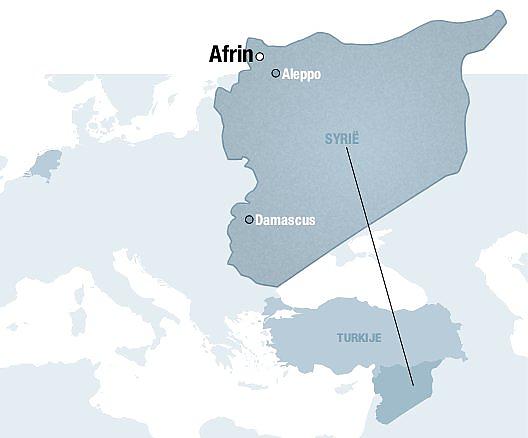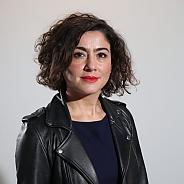The fall of Afrin
The fall of Afrin

'Operation Olive Branch' – it would be hard to come up with a more cynical name for the Turkish invasion of the northern Syrian town of Afrin. Since January 20th, when the first Turkish bombs fell, the invasion has cost hundreds of lives, while the world watches on. SP foreign affairs spokeswoman Sadet Karabulut, MP, continues to urge an uncompromising condemnation of President Erdogan's warmongering politics. She was interviewed by Leslie Arp for the SP monthly De Tribune, where this article first appeared, in the original Dutch.
 Since 2012, a year after the outbreak of the Syrian Civil War, Afrin has formed part of the autonomous Democratic Federation of North Syria, also known as Rojava. According to the UN, about 300,000 people live in Afrin and the surrounding area. Around a third are Syrians who who have fled other areas. “Afrin belonged to the only stable region in the north of Syria,” Karabulut explains. “Rumour has it that there was self-government, formed by Kurds, Christians, Jezidis and Arabs.”
Since 2012, a year after the outbreak of the Syrian Civil War, Afrin has formed part of the autonomous Democratic Federation of North Syria, also known as Rojava. According to the UN, about 300,000 people live in Afrin and the surrounding area. Around a third are Syrians who who have fled other areas. “Afrin belonged to the only stable region in the north of Syria,” Karabulut explains. “Rumour has it that there was self-government, formed by Kurds, Christians, Jezidis and Arabs.”
On 18th March Afrin fell and Turkish flags were waved in the streets of the Syrian town. The Kurdish fighters, who in the Syrian civil war played the role of 'boots on the ground' for their ally the US, withdrew. Jihadists, recently driven from the area by Kurdish armed forces, worked actively with Turkey to take Afrin from the Kurds.
How does Turkey justify this brutal invasion?
“Turkey refers to the right of self-defence. But evidence that this is appropriate remains to be produced. So it's an illegal, aggressive invasion in contravention of international law, and is having disastrous consequences.”
How does Operation Olive branch relate to the domestic tensions within Turkey?
“Turkey equates the Kurdish militia in Rojava, the YPG, with the Turkish-Kurdish PKK, which for the Turkish regime is the justification for this operation. But what it comes down to is that Erdogan needed the invasion of Afrin to strengthen his domestic position. He's evolved into a despotic leader, one who wants to eliminate all forms of opposition.”
Last year's referendum on the Turkish constitution and the elections which followed formed, Karabulut argues, important opportunities for muscular politics. “Erdogan won that referendum by the skin of his teeth. If it had been fair and honest, he would certainly have lost. So he took some blows, and the invasion of Afrin was a handy lightning rod.”
The extreme right Grey Wolves, but also a section of the secular social democratic party, have, Karabulut says, gone along with these 'patriotic' sentiments. “But those who protest against this war, for example the academics who signed the peace pamphlet, were rounded up. Operation Olive Branch is, for Erdogan, a new way of furthering repressive policies in his own country.”
Erdogan has from the word go been looking to prevent the Kurds in Syria from being able to create a stable administration on the Turkish border, which is why they invaded another country illegally.
What impact has the fall of Afrin had on a region which was already unstable?
“In the region there has been permanent war since the invasions of Afghanistan and Iraq. What began hopefully in Syria with the Arab Spring, has become a civil war which has brought hundreds of thousands of deaths and millions of refugees. The Assad regime's brutal actions were already subjecting the Syrian people to thoroughgoing oppression, but interference by foreign powers has intensified the conflict.”
Karabulut regards the terrorist movement ISIS as a monster created in part by these foreign interventions. This makes her especially bitter over the fact that the attack on Afrin hit the Kurdish fighters, people who had risked sacrificing their lives in the fight against ISIS. “This makes Turkey itself, but also NATO, completely untrustworthy,” she says. “But also international leaders are untrustworthy when they fail to respond to this action. Although Turkey can hold up a mirror to them in reaction, asking America and Russia what they have to offer by way of a solution in Syria. What they should all actually be doing is working towards peace talks, towards giving diplomacy a chance. People must have once again the chance to control their own country, their own future. That's the only way in which the breeding grounds of Jihadism can be tackled and the deaths and the war ended.”
Why has our own government failed to condemn this?
“On the one hand relations between the Netherlands and Turkey have reached a nadir. For instance, at the moment we don't have an ambassador in Turkey. But on the other hand Prime Minister Mark Rutter did sign the EU-Turkey deal in 2016 – the dirty deal, as we call it,” says Karabulut. This agreement between the EU and Turkey tasked Erdogan with preventing more refugees from coming into Europe, in exchange for billions in EU money. “From the point of view of this deal itself little is at the moment going right. Turkey certainly won't hasten its accession to the European Union, and thousands of refugees are living in appalling conditions in Greece. In part through pressure from the SP, the Dutch government has advocated the suspension of payment of the billions in aid to Turkey. But unfortunately there has been no agreement on this at European level.” European countries are unwilling to condemn Turkey because Erdogan has threatened to tear the agreement up, and because it's an important NATO partner.
On 23rd March (the respected daily newspaper – translator's note) NRC reported that the Turks had used EU millions to keep Syrians out using heavy-handed methods. Thanks to Europe, Turkey was able to buy eighty-two Cobra armoured vehicles, enabling the detection of refugees who then risk being shot. Remarkably enough, this was on top of the Turkey deal.
The SP is keeping up its demands for a strong condemnation from our government. How much chance is there that the Dutch foreign minister, Stef Blok, will show some backbone?
"In Parliament we're keeping up the pressure, and I have noticed that that helps. The government was in the first instance completely uncritical, but has shifted a little. But in the end it's pressure from the public that's needed. In Germany there's a discussion going on about Operation Olive Branch. Our neighbour to the east, in common with the Netherlands, supplies arms to Turkey. German tanks are being driven through Afrin. How can something like that be explained?"
"But as long as we in Europe have cowardly leaders, who don't put people's interests first, things will continue to stagger on. Going for a military solution, supplying arms, permanent war, these simply bring more terrorism, more deaths and more refugees. In the first instance this hits people who live in war and have to flee, but in the end we'll all be the victims. When I look at the horrible pictures of refugees living in captivity in Greece, I think we need an alternative policy to bring about change. We have to insist on a politics without weapons."
- See also:
- World
